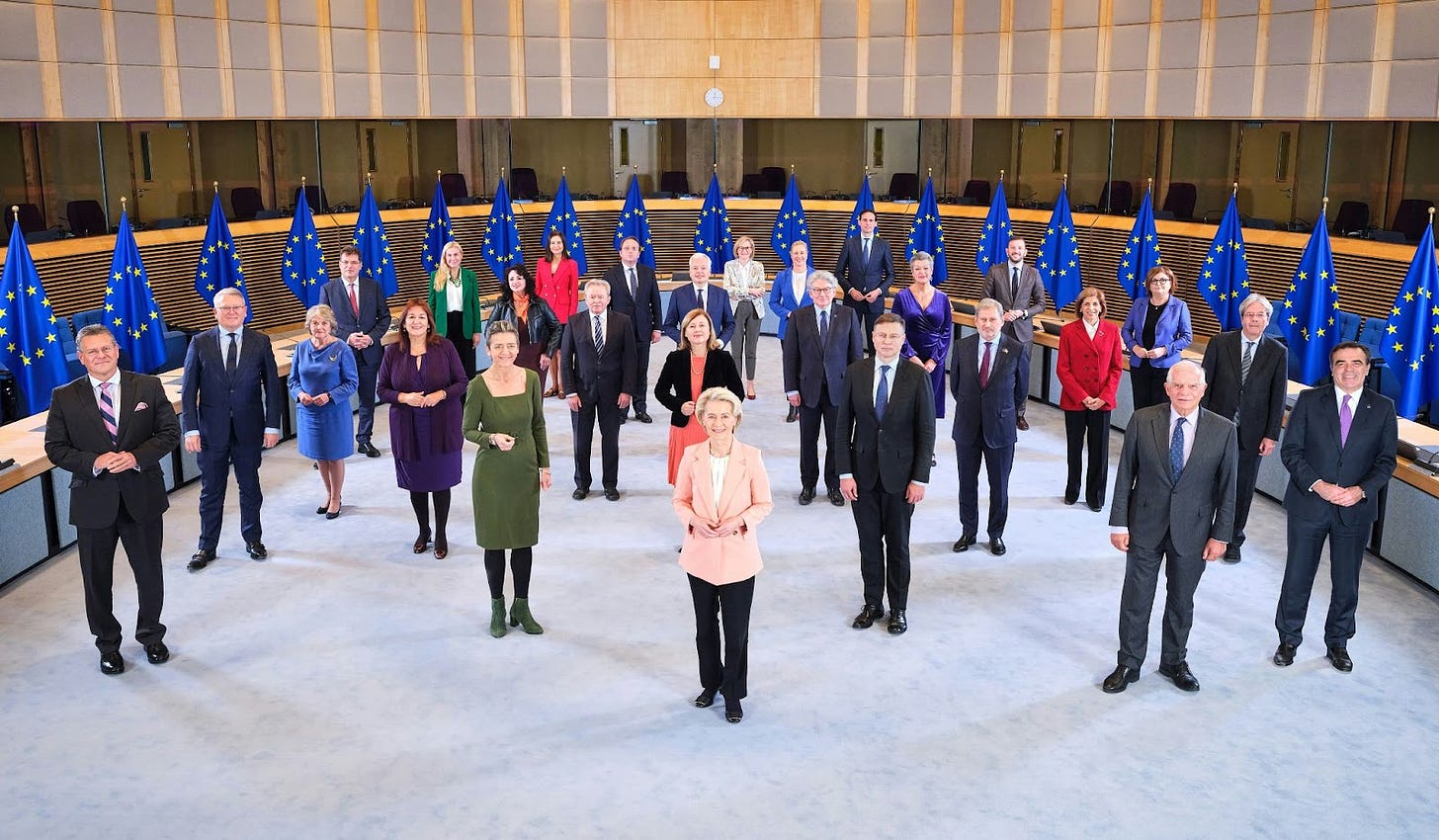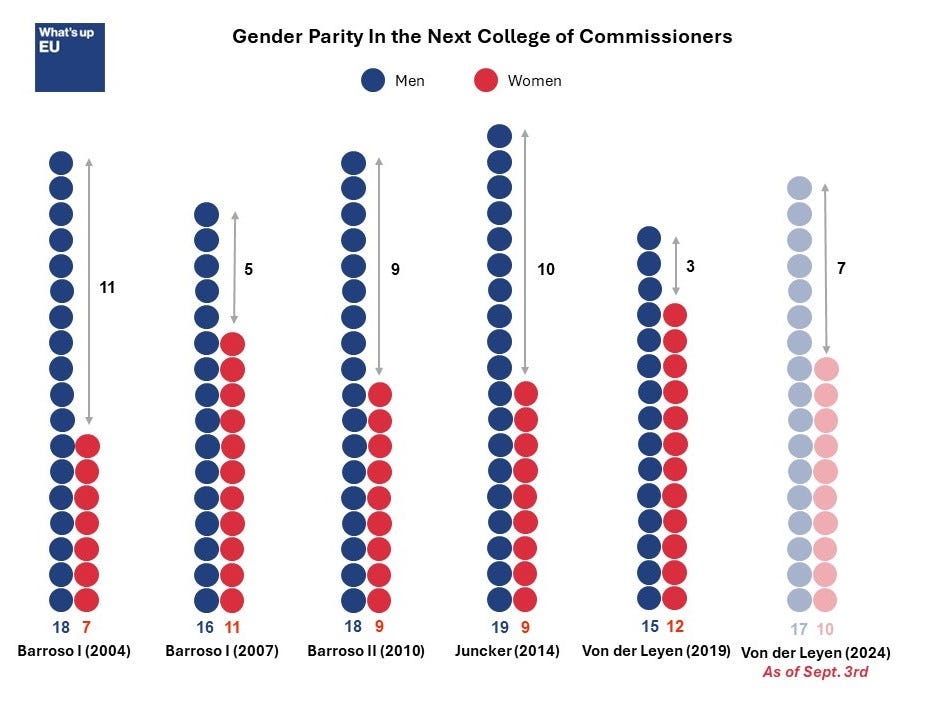Back to school
Everything you need to know about the next European Commission • But also — Durov’s Arrest, Musk & Breton, Chinese Tariffs, Eurozone Inflation
Welcome back! What’s up EU is back for a new season. Find us in your inbox every Tuesday, and follow us on Twitter and LinkedIn.
We hope you had nicer holidays than Thierry Breton, Valdis Dombrovskis, Elisa Ferreira, and Věra Jourová — who were all on duty at the Berlaymont in Brussels throughout August.
Things are still quiet at work? Well, you can now play Fortnite on your iPhone or Android, thanks to the European Union. With the Digital Markets Act (DMA), Google and Apple are now required to allow developers to offer their apps on their own “app stores” in Europe.
The Briefing
While Brussels is just getting back to life after summer break, political negotiations are steaming ahead to nominate the next college of Commissioners. The 2024-2029 mandate will only begin once all European commissioners (and their portfolios) have been determined, following a process fraught with challenges.

BACK TO BUSINESS • What is happening in the European Union:
The College of Commissioners will hold its first meeting on September 4.
The first plenary session of Parliament will take place from September 16 to 19 — a constitutive plenary was held in July.
The Council of the EU resumed its activities at the end of August with informal meetings between national ministers.
The European Council (which brings together the heads of state or government of the EU 27) will meet on October 17 and 18.
The Parliament’s political groups and committees were formed before the summer break.
As a result, all eyes are on the European Commission. Ursula von der Leyen was reappointed as Commission president in July, but the names and portfolios of the other 26 commissioners (one per member state) have yet to be determined.
GENDER PARITY • EU Member States had until the end of August to propose names to Ursula von der Leyen.
All met the deadline except Belgium, where tough negotiations to form a government coalition are overlapping with this deadline. Nonetheless, Belgium has now proposed a candidate, Hadja Lahbib, coming as a shock to Belgian Commissioner Didier Reynders who expressed his “deep disappointment”.
In her letter to member states in July, Ursula von der Leyen requested that two names be proposed by each country: one man and one woman. Von der Leyen's goal is to achieve gender parity within the College of Commissioners.
But only Bulgaria complied with the former request. Other countries have only proposed one candidate.
At the start of her first term, von der Leyen managed to convince several Member States to propose a woman instead of a man. As a result, the College was almost gender-balanced, with 12 women and 15 men.
This time, European capitals have proposed nearly twice as many men as women. If Belgium had proposed a man (and assuming an unchanged gender balance after parliamentary hearings) the College of Commissioners could have potentially become the least gender-balanced since the mid-2000s. However, Romania has now changed its candidate and put forward a woman.
This change, along with the Belgian proposal, has now made the potential new College of Commissioners slightly more balanced. Historically, the number of male commissioners has always exceeded the number of female ones.
ROOM FOR MANEUVER • Can Ursula von der Leyen refuse candidates put forward by Member States? This is what she implied in 2019:
"I will ensure full gender equality among commissioners. If member states do not propose enough female Commissioners, I will not hesitate to ask for new names. Since 1958, there have been 183 commissioners. Only 35 were women. That is less than 20%."
However, nothing in the treaties obliges member states to propose more than one name. There is also no provision on gender balance.
The Treaty on European Union (TEU) does state, however, that "the Council, by common accord with the elected President, shall adopt the list of the other persons whom it proposes for appointment as members of the Commission" (Article 17). Furthermore, the names proposed by member states are only "suggestions." Von der Leyen therefore theoretically has room for manoeuvre.
In practice, it seems unlikely she will risk offending Member States by rejecting candidates— she needs the support of the EU’s capitals, and it is unlikely she will use political capital on this issue. However, a significant gender imbalance could potentially jeopardise the approval of the College by MEPs.
Once Ursula von der Leyen has decided on the distribution of portfolios, the commissioners will have to undergo challenging parliamentary hearings.
Parliament will then vote on the entire College of Commissioners by simple majority. The lack of gender parity could be a point of contention, as the European Parliament's rules of procedure encourage MEPs to consider this aspect when evaluating candidates.
THE NAMES • The complete list of candidates proposed by Member States is available here.
Commissioners who may be reappointed include Thierry Breton (France); Valdis Dombrovskis (Latvia), for a third term; Maroš Šefčovič (Slovakia), who has been a European Commissioner since 2009; Wopke Hoekstra (Netherlands); Olivér Várhelyi (Hungary); and Dubravka Šuica (Croatia).
As expected, Margrethe Vestager was not proposed by Copenhagen, as the social-liberal party is no longer part of the ruling coalition in Denmark. After 10 years as the face of competition policy in the EU, the person who allegedly inspired the main character in the TV series Borgen is leaving the Commission.
In coordination with Member States, Ursula von der Leyen will now have to distribute the portfolios. This distribution must satisfy the capitals as well as the various political families, whose support will be crucial in Parliament. It is worth noting that commissioners, once in office, are supposed to be neutral.
TIMING • If Parliament does not reject any candidates, the Commission will be sworn in on November 1. In previous instances, 2 to 3 candidates were rejected by MEPs. The timetable could therefore easily be extended to December 1, or even January 1.
One thing is for sure: the work of the future European commissioners will only begin in 2025.
In Case You Missed It
TECHLASH • The CEO of the messaging app Telegram, Pavel Durov, was arrested in Paris on August 24. French authorities accuse Telegram of failing to properly moderate illicit content such as child pornography or drug trafficking.
His arrest comes as the European Commission has expressed its doubts about the figures provided by the company under the Digital Services Act (DSA).
The DSA imposes a series of strict obligations on very large online platforms (so-called “VLOPs”) with more than 45 million active monthly users in the EU (TikTok, Instagram, X, among others), particularly in terms of moderation and combating illegal content.
VLOPs are directly supervised by the European Commission.
Telegram reported 41 million active monthly users within the EU in February and did not provide updated figures to the Commission in August.
The Commission is reportedly investigating the number of users as well as the methodology used by Telegram to count users, according to information from the FT.
In early August, Thierry Breton sent a letter to Elon Musk. The Internal Market Commissioner warned the owner of X (Twitter) — who interviewed Donald Trump live on the platform — about the risk of spreading harmful content.
His move irritated the Commission, which distanced itself from Breton. “The timing and the wording of the letter were neither co-ordinated or agreed with the president nor with the [rest of the College of commissioners]”, a spokesperson said.
ANTI-DUMP(L)ING DUTIES • On August 20, as part of its anti-subsidy investigation into electric vehicles produced in China, the Commission sent the draft of its final conclusions on establishing anti-dumping duties to interested parties.
This is a procedural step in terms of anti-dumping duties: it allows the automakers targeted by the investigation to present their observations.
After this phase, the Commission will present a draft decision to Member States, and the measures will be adopted unless a qualified majority opposes the Commission's proposal.
The decision will be final by October 30 at the latest.
At this stage, the anti-dumping duties are set for SAIC (36.3%), Geely (19.3%), BYD (17%), and Tesla (9%). Other manufacturers that cooperated with the investigation will face a rate of 21.3%. Those that did not cooperate will be subject to a 36.3% customs duty.
Unsurprisingly, China is protesting the results of this investigation. Beijing launched an investigation into dairy product imports the day after the draft conclusions were published (August 21) — China wants to punish France for supporting measures against electric vehicles produced in China.
INFLATION • The annual inflation rate in the eurozone fell from 2.6% (July, up from June) to 2.2% (August), its lowest level in 3 years. Inflation is therefore approaching the European Central Bank's (ECB) target of 2%.
This raises the possibility of another ECB rate cut (to 3.5%) at the Governing Council meeting on September 12, the last cut being in June 2024.
Philip Lane, Chief Economist at the ECB, said that future rate cuts are likely.
Lane believes that a rate path that is too high for too long could result in chronically low inflation relative to the 2% target in the medium term.
However, the Irish economist still believes that a return to 2% is not yet certain.
The drop in inflation in August is mainly due to a sharp decline in energy prices and base effects. If we look at core inflation, which excludes volatile items (energy, food, alcohol, and tobacco), the decline is much less pronounced: it drops from 2.9% to 2.8% year-on-year, from July to August.
Caution is therefore still warranted, especially as services are experiencing rising inflation year-on-year: 4.2% in August, compared to 4.0% in July. Many economists attribute this increase to the Olympics.
What We’re Reading
In a column for Project Syndicate, Jean Pisani-Ferry wonders whether European leaders will prove capable of enacting the changes needed to secure the EU's future.
In Politico, Carlo Martuscelli, Kathryn Carlson and Hanne Cokelaere remind us what is at stake with Europe’s plans to create a capital markets union.
This edition was prepared by Augustin Bourleaud, Elisa Zevio, Maxence de La Rochère, and Hana Rajabally. See you next week!



